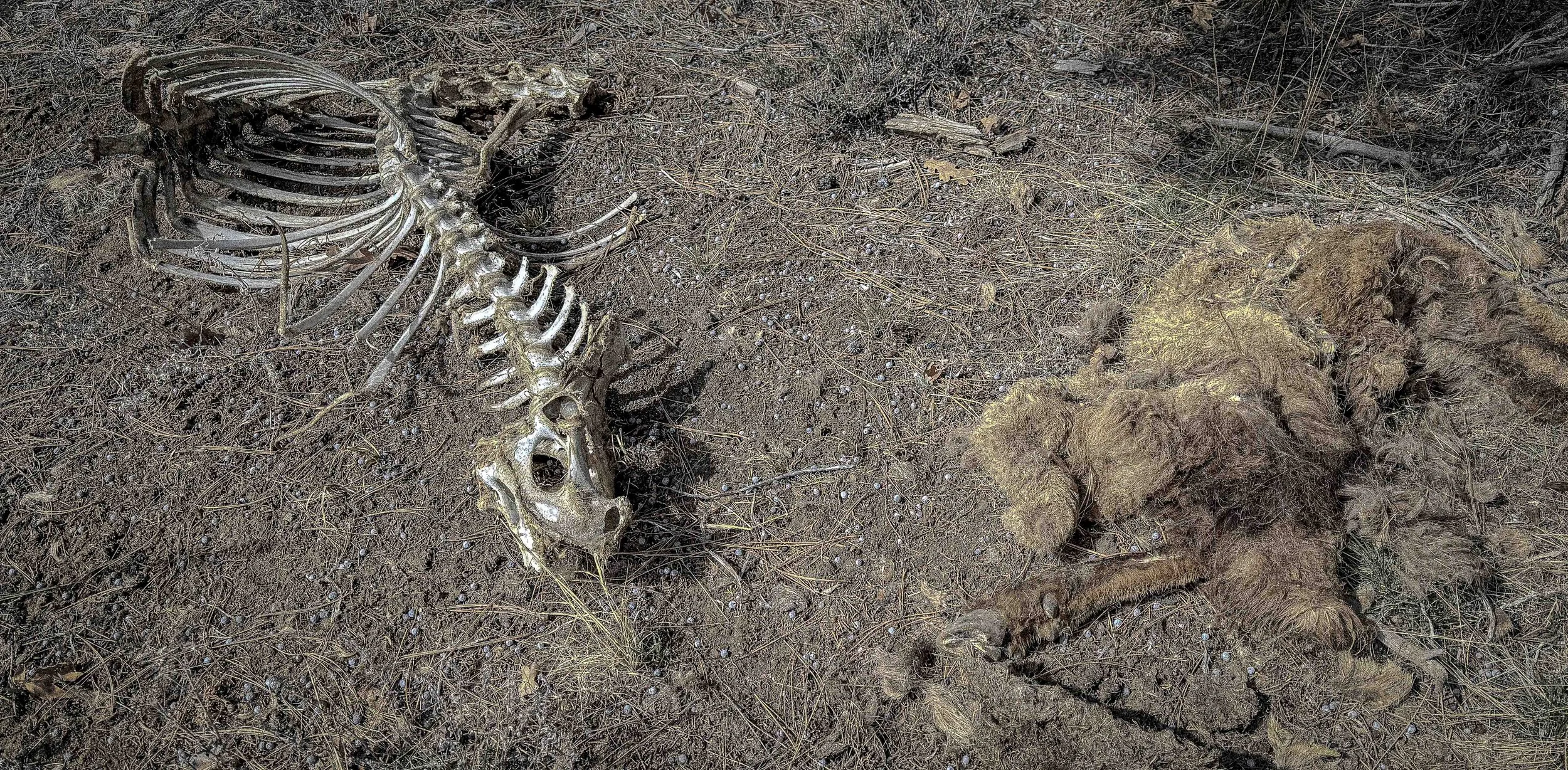The Shopping Cart Phenomenon
To see a World in a Grain of Sand …
—William Blake
There is death, and then there’s death. On the one hand the clean and honorable demise of a predator-prey relationship—violent, perhaps, but in harmony with the mechanics of the cosmos—or the dignified withdrawal at the end of a completed lifespan; and on the other the sordid squalor of wanton carnage.
A few days ago my wife and I, anticipating spring, ventured to a trailhead just a few miles from our bucolic home. We’d been there before. But this time, killing the engine, I pointed to the parking area’s edge and asked, “Is that … a rib cage?”
She squinted. “Looks like it,” she said. “An elk.”
We got out. Approached, with a certain trepidation.
“Look,” she said, “there’s more.”
There was. Lower legs with hooves attached. A hollowed pelvis. As we followed the telltales like rookie cops stumbling upon an unexpected crime scene, the extent of the charnel house revealed itself in accelerated exposure: tangles of hide, armatures of spine and rib, yawning jaws with fringes of dried flesh; deer, elk, coyotes, foxes, even a decayed and distorted beaver carcass. And though the tag-ends of winter still chilled the chilling scene, tendrils of the stench that would doubtless turn intolerable with the coming spring were already rising from the sloping drainage that had become an open mass grave.
“Who …” my wife murmured, “would do this?”
Nor was it the kind of question that expected any conscionable answer.
Who indeed?
I can hear you wondering about now: what can this possibly have to do with shopping carts? I know, I know, but we’ll get there; I promise.
What kind of person … but we proceeded with our country stroll, leaving the worst of the slaughter behind. Encountering another couple on the trail, we asked—and were told that hunters had begun dumping their leavings here. A ranger had apologized to the couple that it was legal, that nothing could be done. Once they’d watched a truck, presumably from a nearby hunting outfitter, back up to the brow of the slope and begin emptying trashbags of offal and other unwanted refuse of innumerable kills over the side.
By the time we got back from our hike the day had warmed and the smell had worsened. It was the same smell, I reckoned, that would be rising from the undiscovered bodies trapped in the rubble of Gaza, Ukraine, or any other conflict zone. Because we are all, in the end, made of the same stuff; we are all, in the end, just meat.
A pause, writing this, for a breath of untainted air. Even days later, a disembodied horror can overtake me, its scent stalking memory.
There is a particular strain of rage that suffuses me when, looking for a space in a crowded parking lot, I turn into a desperately sought gap only to find it occupied by a shopping cart, two wheels maybe up on the scrawny planter that separates the rows, while the shopping cart depository is a mere fifty feet away.
What kind of person, I ask myself or the universe, fuming, would do this?
Because to see the world in a grain of sand, look no further. Then the question becomes: is it malice, or just indifference? Are we so oblivious to the shared nature of existence?
It’s a free country, isn’t it. Meaning I can do whatever the fuck I want. Dump body parts at a trailhead parking area. Spill sewage into my personal creek, regardless of who—human or otherwise—might be living and drinking downstream. Make whatever profits I can garner from whatever entrepreneurial fantasy I can fabricate, ignoring possible consequence. Start a war, spread a virus, eradicate a species, despoil a wilderness, impoverish a generation of children, cripple the very atmosphere.
Or leave a shopping cart wherever I’ve emptied it, because it’s served its momentary purpose.
Anthropologists suggest that we evolved, that we managed to survive at all, because of our capacity for cooperation. So ask yourself, as I frequently and fruitlessly do: what happened to make us this way?
A simple question to articulate but a difficult if not impossible one to answer. Nevertheless, we should make the attempt, shouldn’t we? Because we are wading through the detritus of centuries, millennia, of our history of misbehavior, and it will be a gargantuan task to remediate the damage. The only alternative is to accept the killing fields, the maimed and orphaned survivors of our endless wars, the anguished dispossessed, the desecrated biosphere, as the ultimate legacy of our meteoric achievements.
Or maybe we can begin, singly and collectively, by simply putting the shopping cart back where it belongs.
Lawrence Blair Goral
14 March 2024
Bayfield, Colorado
